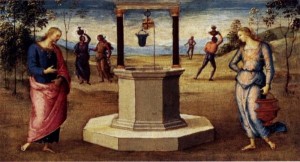This, the fifth week of Pascha, is called the “Sunday of the Samaritan Woman” in the Church calendar. The subject of the feast is the Savior’s conversation with a certain woman at Jacob’s Well in Samaria.
The circumstances of this meeting were unusual in many regards. First, Christ’s words were directed to a woman, when Jewish scribes of the time admonished: “No one should converse with a woman on the road, not even with one’s lawful wife”; “do not converse at length with a woman”; “it is better to burn the words of the Law than to teach them to a woman.” Second, the Savior’s interlocutor was a Samaritan, that is, a representative of a Jewish-Assyrian tribe hated by “pure” Jews to the point that any contact with Samaritans was considered defiling. Finally, the Samaritan woman appeared to everyone to be a sinner, having had five husbands before uniting in defilement with yet another man.
But it was precisely this woman, a heathen and a fornicatress, “burning with the heat of many passions,” that Christ, the seer of hearts, favored to give the “living water that dries up the sources of sin.” Moreover, Jesus revealed to the Samaritan woman that He is the Messiah, the anointed of God, which he did not do always or to everyone.
Speaking of the water filling Jacob’s Well, the Savior remarks: Whosoever drinketh of this water shall thirst again: but whosoever drinketh of the water that I shall give him shall never thirst: but the water that I shall give him shall be in him a well of water springing up into everlasting life (John 4:14). This is, of course, an allegorical distinction between the Old Testament law and the miraculous abundance of grace in man’s soul in the New Testament.
The must important point of the conversation in Christ’s answer to the Samaritan woman about how one ought to worship God: on the mountain of Garizim, as her coreligionists do, or in Jerusalem, following the example of the Jews. Believe Me, the hour cometh, when ye shall neither in this mountain, nor yet at Jerusalem, worship the Father, Jesus replies. But the hour cometh, and now is, when the true worshipers shall worship the Father in spirit and in truth: for the Father seeketh such to worship Him (John 4:21, 23).
In Spirit and in Truth: this means that faith is not limited to rites and rituals, that it is not the dead letter of the law, but active filial love that is pleasing to God. In these words of the Lord we simultaneously find the fullest definition of Christianity as a life in Spirit and Truth.
Christ’s conversation with the Samaritan woman was the first preaching of the New Testament to the non-Jewish world, and it included within it the promise that namely this world would accept Christ.
The great event of the meeting of man and God at Jacob’s Well brings to mind the remarkable words of an ancient theologian, who claimed that the human soul by its nature is Christian, “but according to its sinful daily habits, it is a Samaritan.” We may take objection to this. Let that be. But let us remember that Christ revealed Himself neither to the Jewish High Priest, nor to King Herod the Tetrarch, nor to the Roman procurator, but revealed His heavenly appointment to this world to a sinful Samaritan woman. It was namely through her, by God’s providence, that the inhabitants of her native city came to Christ. Indeed, thousands are saved around a single person who has acquired the truth of the Holy Spirit. So it was, so it shall be. For the source of the water of Salvation, with which Christ blessed us all, is an inexhaustible spring.
According to tradition, the Savior’s interlocutor was the Samaritan woman Photini (the Greek parallel of the Russian name Svetlana), who was dropped into a well after brutal torture for preaching the Lord.
Source: ORA ET LABORA




















